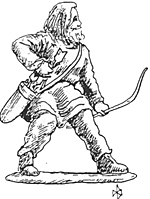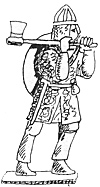Ethos
 The aim is to have a quick play set of rules for solo play where a skirmish game, with 8-14 figures per side, can be completed in 1-2 hours of play.
The aim is to have a quick play set of rules for solo play where a skirmish game, with 8-14 figures per side, can be completed in 1-2 hours of play.
Warbands
Unless the scenario dictates otherwise each warband can have between 8 and 14 figures. Eight automatically, then d6 to decide how many additional figures.
There are four classes of figure – leader, character, warrior and peasant. There is only one leader per warband and no more than 20% of a warband can be classed as characters.
Nominate a leader for each warband.
Sequence of play
Decide Action
Move
Combat
Morale
Decide Action
At the start of each turn the warband may wish to take certain actions e.g. cross the river, seize cattle, attack the village. Before the action is taken decide the degree of difficulty for this task and assign an action score between 0 and 100 e.g. cross the river may have an action score of 10, seize cattle may have an action score of 30 and attack the village may have an action score of 60. Roll a % die to determine whether or not the warband carries out the action or not, adjusting in relation to casualties (see morale). A score equal to or greater than the action score means the action is taken, less than the action score means the action isn’t taken.
I’ve also used this method to resolve issues that come up during the course of the game and aren’t covered by the rules.
Movement
Movement is determined by drawing from a pack of playing cards, red for one side, black for the other, to decide which side moves first.
Basic movement is 2d6. Roll once for each warband and each warrior may move the rolled distance or less. The die roll is modified when crossing rough terrain, river, fence etc, or carrying/leading loot by subtracting the highest die score.
Combat
Who can fight:
- 1. Opposing figures that are in base-to-base contact at the end of the movement phase must engage in combat.
2. Any one figure can only have a maximum of three opponents at any given time.
For each figure in combat roll one die, the die to be rolled varies depending on the class of the figure.
- Leader – d20
Character – d12
Warrior – d10
Peasant – d6
Any figure carrying/leading loot –2 on die roll.
Highest die in roll off kills opponent.
- 1. If the die rolls are tied, roll again until a victor is found.
2. With multiple opponents the lone figure must beat all of the attacking roles one at a time or the figure is killed.
Morale
 At the end of each combat round check the morale for the warband. There is no specific morale score, however casualties will count against the warband’s ability to take action during the rest of the game i.e. 20% casualties results in a 20% reduction in ability for action.
At the end of each combat round check the morale for the warband. There is no specific morale score, however casualties will count against the warband’s ability to take action during the rest of the game i.e. 20% casualties results in a 20% reduction in ability for action.
As the game goes on and casualties increase the chance of actions being taken can diminish and reflects the decrease in morale, weariness etc. that prolonged combat can bring.
Replacing leaders
If the leader is killed, roll for the remaining characters in the warband. The selected figure then becomes the leader and they receive the leaders combat die roll i.e. d20.
As and when the campaign ever gets going (basically when I stop meddling with my current project, WWII Eastern Front, nothing like a bit of diversification), I’ll type up the campaign notes and put an article together.
Kingdoms of Britain: Background
Back to Table of Contents -- Lone Warrior # 144
Back to Lone Warrior List of Issues
Back to MagWeb Magazine List
© Copyright 2003 by Solo Wargamers Association.
This article appears in MagWeb (Magazine Web) on the Internet World Wide Web.
Other articles from military history and related magazines are available at http://www.magweb.com
